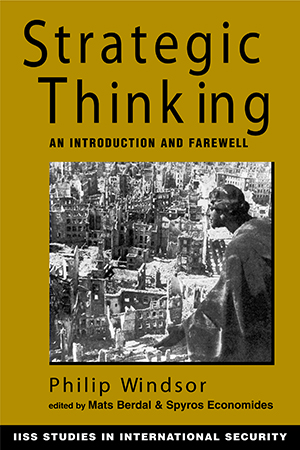In this, his final book, Philip Windsor explores the emergence, meaning, and significance of the Cold War mentality. Tracing the evolution of strategic thinking from its origins in medieval Europe to the demise of the Cold War, he considers the peculiar character and autonomy that strategy acquired in the nuclear age.
Windsor is concerned with changes in our understanding of war and strategy—changes, he argues, that resulted less from technological innovation per se than from the combined effects of technological, social, and political transformations. This process culminated in the nuclear age, when strategic thinking became "self-referring and self-legitimating" and strategic considerations emerged as "the decisive force in the conduct of the politics of states and blocs."
Strategic Thinking addresses many of the themes that preoccupied Windsor throughout his academic career and on which his reflections threw such penetrating light: Soviet strategic thought, arms control, the role of alliances, the guerrilla phenomenon, and the rationality and ethics of nuclear deterrence. The final chapter explores the implications of the end of the Cold War for the future of strategic studies.
During his more than 30 years at the London School of Economics and Political Science, Philip Windsor(1935-2000) established a reputation as one of the most perceptive and thought-provoking thinkers in the field of international relations. Mats Berdal is director of research at the International Institute of Strategic Studies. Spyros Economides is lecturer in international relations at LSE.
No rights in South Asia."Offers readers insight to one of the world's great strategic thinkers."—Parameters
"This book is unfailingly lucid and informative."—William Hopkinson, International Affairs
"This book is an absolute must for any student of strategic thought."—Bill Doll, Parameters
"Deserves to be compulsory introductory reading for all students of strategic studies."—Michael Howard, Twentieth Century British History
"A remarkable and concentrated analysis of the origin and significance of 'strategy' during the Cold War.... This is a splendidly written book, full of thought-provoking insights. Highly recommended."—Choice
"This is a superb tour d'horizon of the history of strategic thought, exploring the fundamental questions of war and peace in their broad philosophical, social, and legal context."—Robert S. Litwak, Woodrow Wilson International Center for Scholars
"Philip Windsor's unique combination of intellectual subtlety and brilliance, of technical competence and moral sensitivity, is at its best in this book. It took someone like Windsor, who never separated strategic, political, and philosophical concerns, to give us the last word on nuclear deterrence, on arms control, on limited war.... The last pages of his book also offer a penetrating and near prophetic insight into the new dimensions of international conflict and the present crisis."—Pierre Hassner, Center for the Study of International Relations (Paris)
"Philip Windsor did much in his lifetime to save strategic studies from blandness and to extend its horizons.... All that he wrote before should be regarded as the preparation for this book, his own farewell to the subject. Its hallmarks were the hallmarks of his life—a deep insight, great humanity and imagination, and a brilliant art of presentation."—Christopher Coker, London School of Economics








